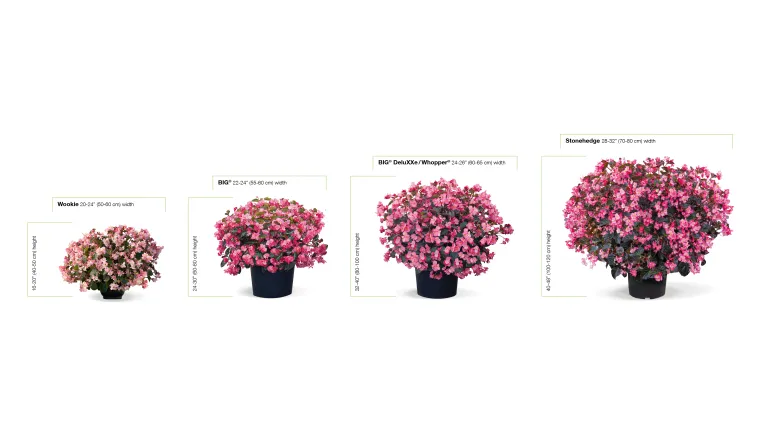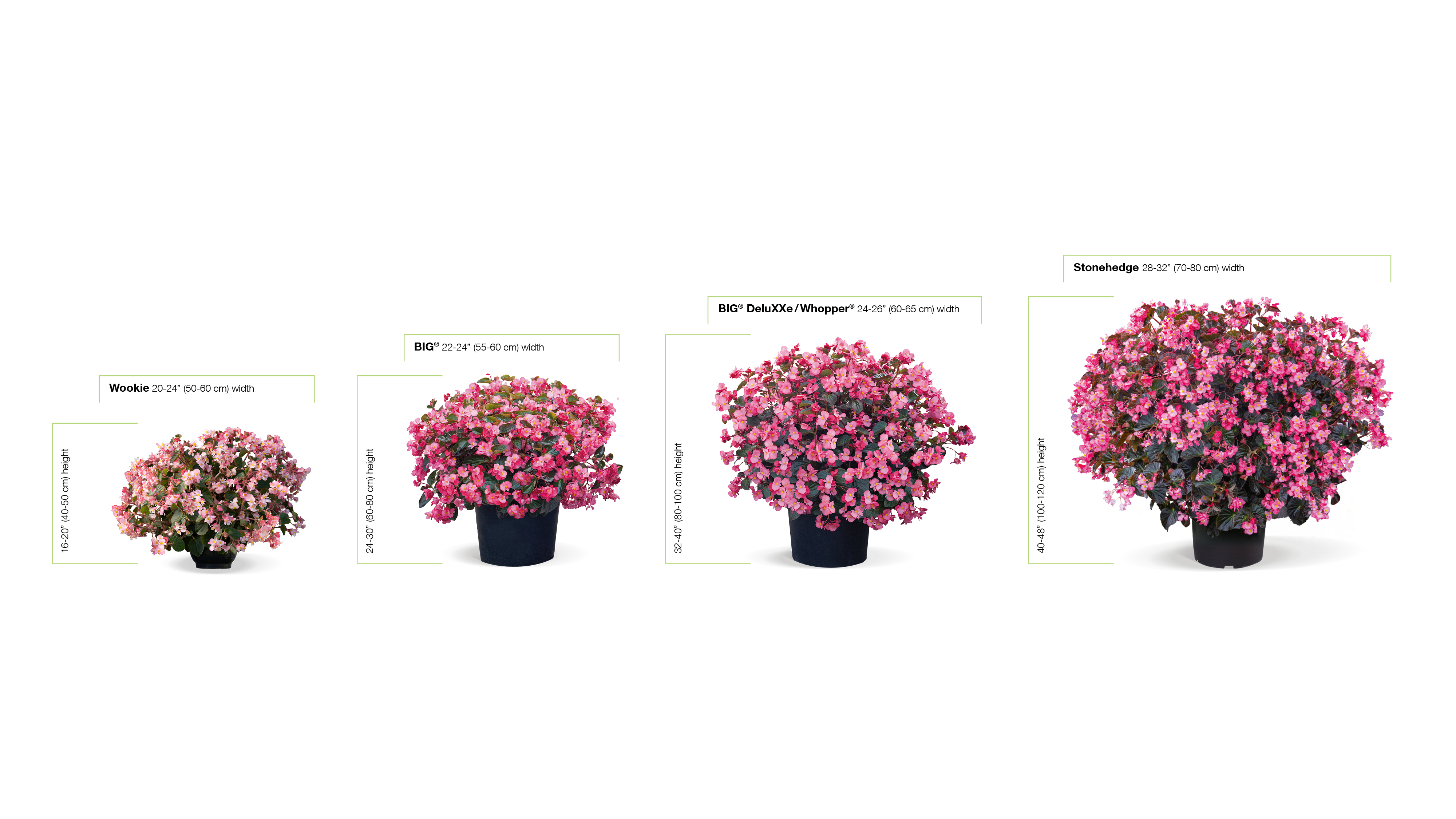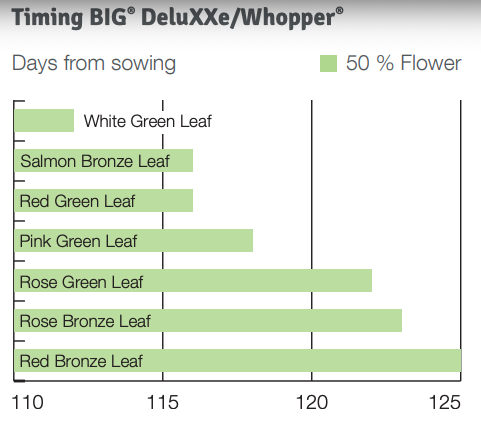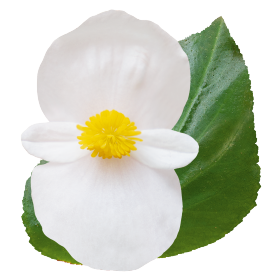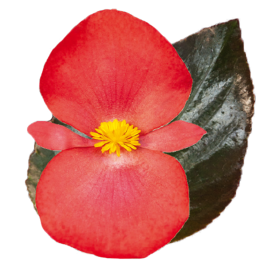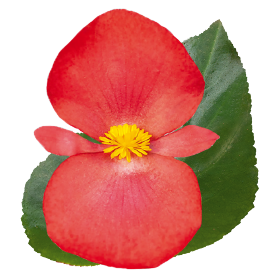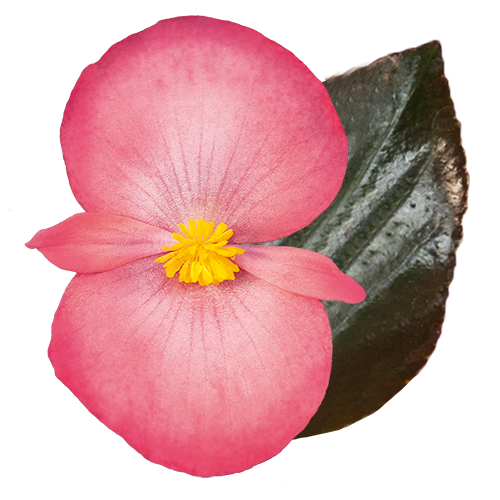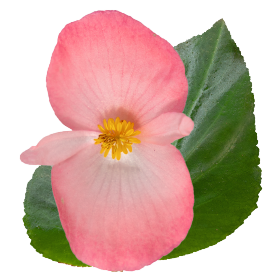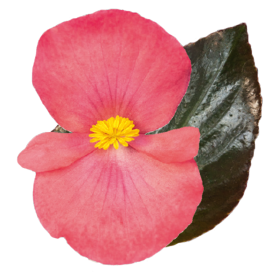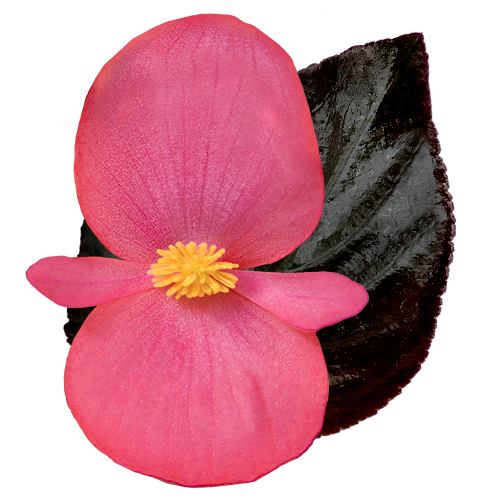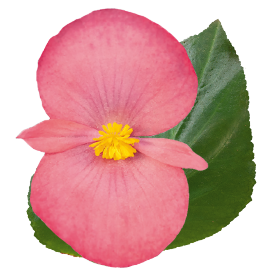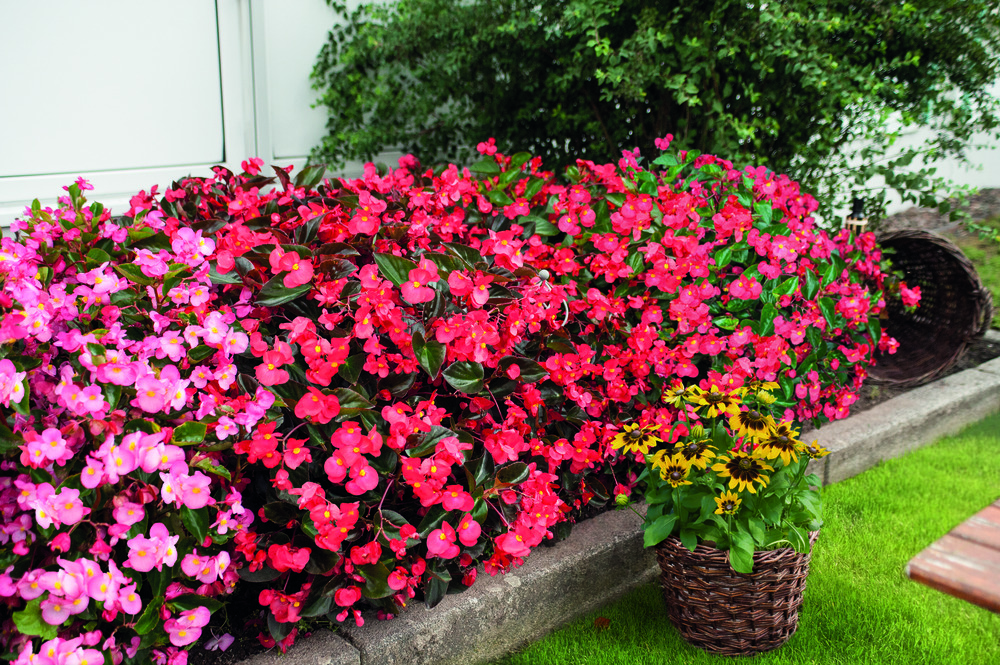

BIG® DeluXXe®
A Premium Product for Premium Landscape Application
- 20–25 % larger than BIG®
- Eye-catching season extender with extraordinary flower power
- Outstanding show as well-branched solitary plant
- Rain and drought tolerant, disease resistant
- Thrives in all climates and soils
Exclusively available as Whopper® through Ball Seed in North America.
- Crop Time
- Spring: 16 - 20 weeks
- Height ∅
- 35 ″ / 90 cm
- Width ∅
- 25 ″ / 63 cm
- Exposure
- Sun - Partial shade
- Seed Form
- Pelleted Seed
- Product Use
- Pots, Hanging Baskets, Mixed Containers, Landscape
- Family, Origin
- Begoniaceae, South and Central America
- Minimum Germ. Rate
- 90 %
Technical Guide
Flowering Type: Obligate long day plant. A day length > 13 hours will result in flower initiation.
Flowering Mechanism: Higher light intensity and warmer temperatures will promote earlier flowering. Supplemental lighting during germination is beneficial but not necessary.
Germination: Optimum conditions for seedling development, beginning on the day of sowing until radicle emergence. Expect radicle emergence in 6-8 days.
Cover: Light is required for germination - no covering.
Sowing method: 1-2 seeds or pellets per plug.
Media: pH 5.5-5.8; EC 0.5-0.75.
Temperature: 22-24 °C (72-76 °F) days 1-11. For irrigation use warm water (above 18 °C/ 64 °F) only.
Moisture: Begin with a saturated (5) for the first 10 days and on day 11 begin to dry them back slightly to wet (4). This will help in the seedlings rooting into the media. On day 11 begin to alternate between a wet (4) and a moist (3) until day 21. On day 21 it is critical to begin a good wet to dry cycle to prevent algae growth and help with the uptake of nutrients. At this point you can alternate between a wet (4) and a medium (2).
Humidity: 95-100 % until day 11; then reduce to 40-60 %.
Dehumidify: On day 11 dehumidify, moving from 100 % to 40-60 %. Provide proper ventilation and horizontal airflow to improve oxygen levels in the media.
Light: Light is required and will help giving a more uniform germination. If germinating in a chamber supply 10-100 ft. candles (100-1,000 lx); (50 Watt/m²) to prevent seedling stretch. Protect seedlings from direct light when moving to stage two. Once established in stage two the light levels can be increased. On days 12-14 light levels can be increased to provide light levels of 6-8 mol/m²/ day (2,000-2,500 ft. candles or 20,000-25,000 lx).
Fertilizer: Maintain an EC < 1.0. Fertilized water should not exceed an EC of 0.5. Initial feeding should be with a balanced fertilizer low in ammonium. Begin feeding on day 10 with a 14-4-14, 14-2-14 or 17-5-17 fertilizer at 50–60 ppm.
Plug Bulking and Flower Initiation: Optimum conditions during the vegetative stage from cotyledon expansion to flower initiation. This stage is when the seedlings root to the edge of the plug and reach the 4-6 true leaf stage where flower initiation occurs.
Media: pH 5.5-5.8; EC 1.25-1.5.
Light: Continue to protect from direct sunlight until they are well established. On day 21-22 the light levels can be raised to 10-12 mol/m²/day (3,000-3,500 ft. candles or 30,000-35,000 lx).
Temperature: 20-21 °C (68-70 °F) night and day. When the roots reach the bottom of the cell the temperature can be lowered to 20 °C (68 °F).
Moisture: Begin alternating between a wet (4) and a medium (3) on day 12. To prevent algae it is important to begin a good wet dry cycle on days 21 where the media will dry back within a 24 hrs. period. Good ventilation and horizontal airflow will create such an environment.
Fertilizer: Begin fertilizing early to improve seedling quality. Under high light conditions more ammonium based fertilizers can be used (17-5-17 and 20-10-20) and under low light use a calcium based fertilizer (14-4-14 or 14-2-14). Initial feeding should start at 50-100 ppm and gradually work up to 100–150 ppm.
Growth Regulators: No growth regulators should be necessary since growth can be controlled by temperature and moisture management. If seedlings are uneven a very light application of B-Nine (daminozide) or Cycocel (chlormequat chloride) can be applied. In the finishing stages lower temperatures of 12-14 °C (54-57 °F) will help to control leaf size and stem elongation. Approximately two weeks after transplanting a plug, when plants are established in the final container, a very light application of Cycocel can be applied.
Fungicides: Scout for botrytis and phytophthora during the plug stage and apply specific fungicides per the recommended labeled rate.
Media: pH 5.5-5.8; EC 1.2-1.5.
Light: Provide 12-14 mol/m²/day (3,500-4,000 ft. candles, 35,000-40,000 lx).
Temperature: 20-21 °C (68-70 °F) nights, 18- 19 °C (64-66 °F) days for the first 14 days or until the roots reach the bottom of the container. Thereafter temperatures may be lowered to 16-18 °C ( 60-64 °F) day and night. An ADT (average daily temperature) of 19 °C (66 °F) will give the fastest finished crop. Once well established in the final container, approximately two to three weeks after transplanting from a 288 plug tray, the temperature can be lowered further to 13-15 °C (56-58 °F). This will keep the plants toned and prevent excessively large leaves.
Moisture: Alternate between moisture levels wet (4) and medium (2). Let plants dry back to at least a medium (2) before re-saturating to a wet (4). Extremely dry plants will have a grayish cast to the leaves. Avoid watering plants under high temperature and light when the leaf temperature is excessive. This can cause leaf burn.
Humidity: 40-60 % humidity is ideal. Providing good ventilation and horizontal airflow will help lower the humidity and dry back the media, providing oxygen to the roots.
Fertilizer: Moderate fertilization levels are required. Fertilize the crop weekly with 100-150 ppm nitrogen, using a complete balanced fertilizer. Avoid high ammonium and high nitrogen levels, because the foliage can grow very large. Avoid pH levels above 6.0, as high pH can cause iron deficiency. Watch for low Ca and Mg levels since this can result in stunted plants with marginal leaf edge burn. Under high light conditions use an ammonium based fertilizer (17-5-17) and under low light use a calcium based fertilizer (14-4-14).
Growth Regulators: With proper moisture and temperature management there should not be a need for growth regulators. If needed apply Cycocel (chlormequat chloride) as a spray at 250-300 ppm one to two weeks after transplant. A B-Nine application can also be used as a spray at 500–750 ppm.
Fungicide: Apply fungicides during long periods of low light and high humidity.
Common Diseases: Botrytis.
Pests: Primarily aphids and thrips.
Post Harvest: Fertilize with potassium nitrate at 100 ppm 1–2 weeks prior to shipping.
Plug Time:
288 tray: 6-7 weeks
128 tray: 8-9 weeks
Finished Time (from 288 tray):
12 cm (5") pots (1*): 8-9 weeks
15 cm (6") pots (1-2*): 9-10 weeks
20 cm (8") pots (3*): 10-11 weeks
30 cm (12") pots (3-4*): 11-12 weeks
*plants per pot
Expert Tip
Do not hold in the plug stage too long. A root-bound plug will promote stretch and delay the crop. Reducing the temperature to 13-15 °C (56-58 °F) in the finishing stages 2-3 weeks after transplanting will keep plants toned with slightly smaller leaves.
Moisture Codes
| Saturated (5) | Water is easily observed when finger is pressed on cell. Water moves freely from the top of the plug to the bottom. |
| Wet (4) | Media looks black and is not glistening. The media feels wet to the touch but there is very little water movement. |
| Moist (3) | Water is not easily visible. When finger is pressed on the cell there is very little movement from top to bottom. |
| Medium (2) | Media is not black, but now looks medium brown. There is no water movement when pressed with finger. |
| Dry (1) | Media has changed color to a very light brown and is dry to the touch. |
All information in our technical guide is based on our own trials and would therefore be as guideline only. Detailed cultivation aspects vary depending on climate, location, time of year and environmental conditions. Benary expressly disclaims any responsibility for the content of such data/information and makes no representation or warranty for the cultivation of any products listed. It is recommended that growers conduct a trial of products under their own conditions.
